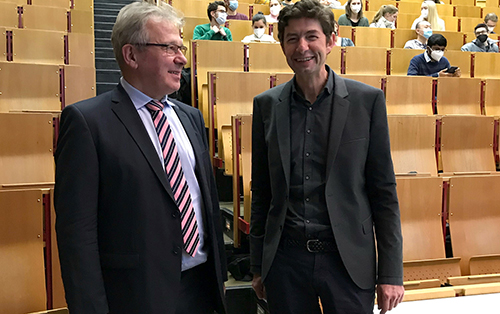Director of Virology at Charité awarded Fritz Hartmann Lecture Prize

From left to right: Prof. Dr. Reinhold Förster, Dean of HBRS and Prof. Dr. Christian Drosten in the MHH lecture theatre. Copyright: "Bettina Dunker /MHH".
12.10.2022
He is one of the world's leading experts on the topic of coronaviruses and, more than any other scientist, represents the special role that science has to play during the COVID 19 pandemic - Professor Dr Christian Drosten, Director of the Institute of Virology at the Charité Mitte Campus of the University Medical Center Berlin since 2017. At the opening of the new semester of the Hannover Biomedical Research School (HBRS) of the MHH, the scientist was awarded the Fritz Hartmann Lecture Prize and spoke on the topic of "Phenotypic changes in emerging coronaviruses".
He congratulated the new students on their decision to come to MHH and encouraged them: "Don't be frustrated if your experiments don't lead to anything even after two years - that's normal in science. But if you stay patient and persevere and keep digging deeper, you will get results!"
Novel viral diseases (emerging infections) will continue to pose major challenges to globalised society in the coming decades. Professor Drosten already established a research programme for the diagnosis of tropical viral diseases at the Bernhard Nocht Institute for Tropical Medicine in Hamburg at the beginning of the 2000s and, among other things, co-discovered the SARS pathogen. Since the foundation of the German Centre for Infection Research (DZIF) in 2012, he has also been involved in coordinating the research area "Emerging Infections" there.
The HBRS Graduate School at the MHH was established in 2003 as one of the first of its kind nationwide with the aim of guaranteeing excellent training for young scientists. In the meantime, the graduate school supervises six doctoral programmes for medical physicians and natural scientists. The HBRS's research focuses on the MHH's priority areas: inflammation, infection and immunology, as well as transplantation, tissue regeneration and implants, as well as oncology.